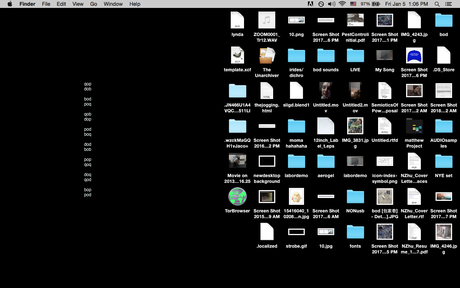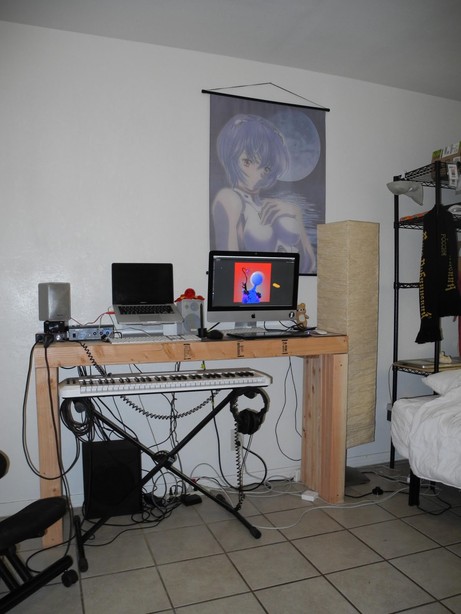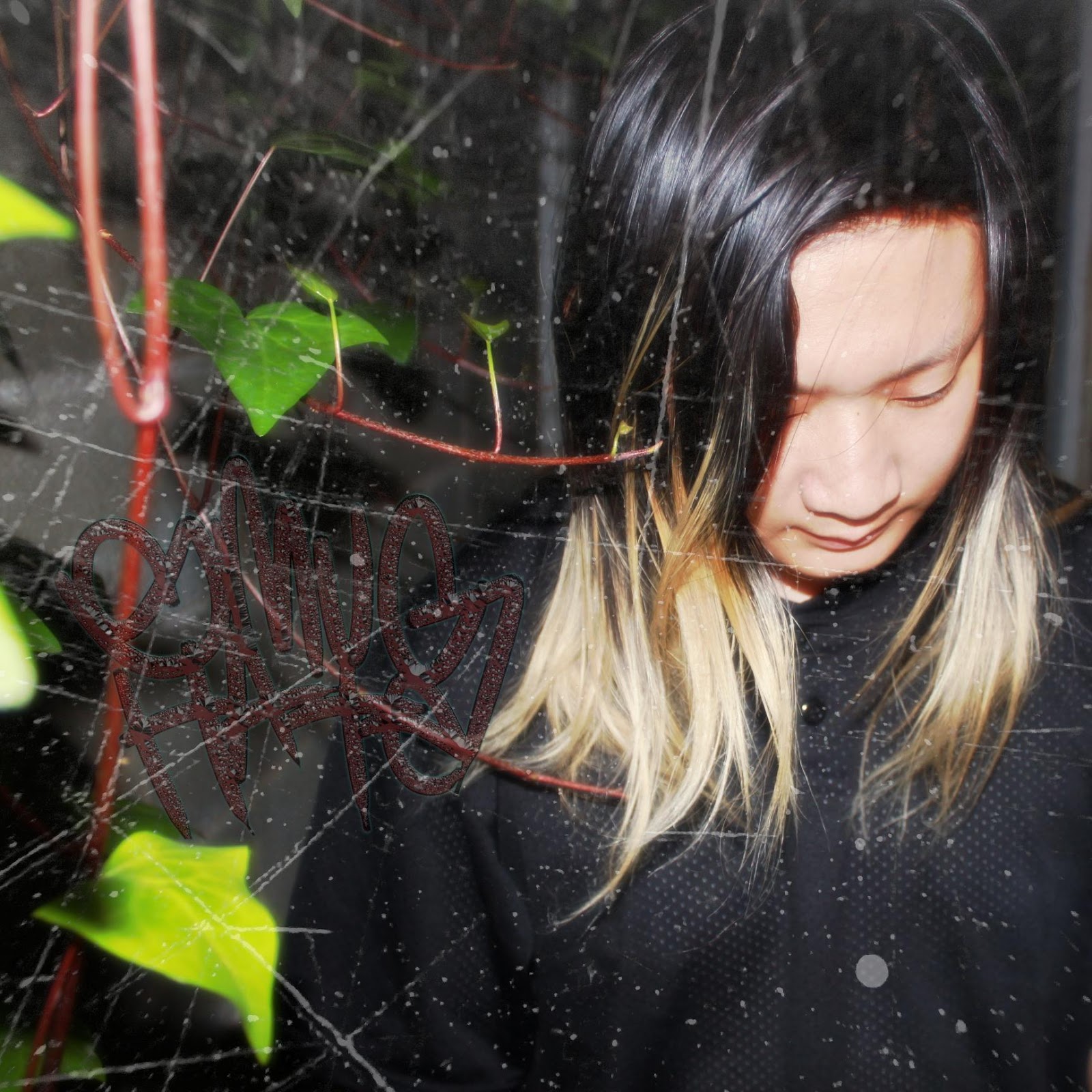Photo by Matt Dell
The latest in a series of interviews with artists who have a significant body of work that makes use of or responds to network culture and digital technologies.
bod [包家巷] - 'Emergence [紧急情况]' (2018) Courtesy of ZOOM LENS
Lauren Studebaker: You work in a variety of mediums, most recently releasing a digital EP, Soliloquy of the Distant Home, under the pseudonym bod [包家巷]. Could you begin by introducing the multiple manifestations of your work, and why lately you’ve felt drawn to producing sound?
Nick Zhu: I moved to Los Angeles and I didn’t have the ability to really make anything while I also tried not to die from poverty. I was kind of making images, I just couldn’t really do very much at all in terms of making.
I think I went back to music because it’s always been in my life. My mom noticed I could play, and then made me play piano (stereotypically) when I was four. I took lessons from a family friend. I got a scholarship into a choir. I played jazz in middle and high school. In college I made music that I don’t want anyone to hear, except for the one track on my SoundCloud.
It only took over as a dominant practice when I came to LA.
Now that I think about it, making anything kind of sucks. Maybe that’s why I’m drawn to it, I don’t know. At least with music I get to perform, which feels good. Making never feels good. Sometimes problem solving is fun, but it’s not definitively “fun” to make art or music. It’s work.
So I guess it’s a “at least I get this one small thing” type decision. Story of my life, hahahahaha.
LS: Your music, especially your newest EP, is haunting, heavy, and uniquely expansive in source material. Your compositions are based on samples “of construction machinery, horror movies, Chinese dramas, choir music, abuse/violence, DJ spinbacks, and, of course, piano music”—why these specific sounds?
NZ: Oooooh, shit.
Construction machinery: I was working at MOCA as AV/Exhibitions Tech at the time, and even when I became director of photography there, I was still around a ton of construction. Lifts going beep beep and saws cutting shit and hammers; it was really like this kind of fetish/torture that people went through for the sake of art and helping rich people launder their money, and it was a part of my life, and it was interesting, in, like, a car crash kind of way.
Horror movies: I loooove horror movie sound design. Not necessarily from “good” movies, or even “good” “bad” movies. I’m just going into YouTube and looking at the trailers and jump scares and stuff. There’s so much good craft spent on just spooking someone, and much of it is so beautiful, all the gorgeous, wet, disgusting sounds. Also, I like watching them. “Like,” as in a “I’m bored and stoned” kind of like.
Chinese dramas: My mom’s Chinese, and literally all she watched (and probably still watches) is Chinese TV, with favoritism towards war dramas demonizing Japanese people, or regular ol’ families falling apart type shit. Stuff she relates to. And I was there...or, I guess I would pass through the room as quickly as possible after getting home. But all the sounds stuck.
Choir music: The choir I was in is run by this very disciplined Catholic guy, who is all about good craft and God. This shit fucked me up the most. Singing Baroque music acapella in a centuries-old mission is fucked up. Singing in a Czech cathedral is fucked up. It’s stronger than any drug I’ve ever taken. I’ve never felt tears come so easily. This is when I started to believe in God.
Abuse/violence: I don’t know about anyone else, but I’m really embedded in the cycles of trauma and abuse. Fucked up shit has happened to me, and I’ve done fucked up shit. I think it’s important to know this about myself, or as my therapist says, to be aware of the desolation that I carry inside me.
DJ spinbacks: I didn’t even know what a DJ does until I moved to LA. Then I moved here and my paragon of healing, change, and growth, Matt Dell (M.D. James), took me to all these warehouse parties, introduced me to the music that gave rise to what I make and listen to. I heard a lot of spinbacks in this initial time period, and they sounded great.
Piano music: I play piano. I make all my music with just a MIDI keyboard and mic. I will never disguise this fact. In my opinion, piano (or I guess harpsichord) was the first DAW.
Also at the end of the day I have a relationship to sound that, even if it is a fad to have, is my personal experience of it and nobody else’s. It’s my little world where C major is rounded and warm colored, where Chino Amobi’s music looks like steel wool burning on a clean sheet of glass, or malibu’s music looks like milk spilling over a pale wooden table in morning light. First rule is that it both sounds and looks pretty.
LS: Would you say that your synaesthetic relationship to the sound you produce is represented in the visual work you make?
NZ: At least on my Instagram there have been multiple instances in which music I was listening to became similar to stuff I posted, but I’ve never sat down, made a track, and then made a visual thing to go with it. It’s also unidirectional, and unfortunately I don’t get to hear sights. The most useful relationship I have between sound and sight is that I can use the materials perceived for perfect pitch, but there’s still around a 20-hertz error margin.
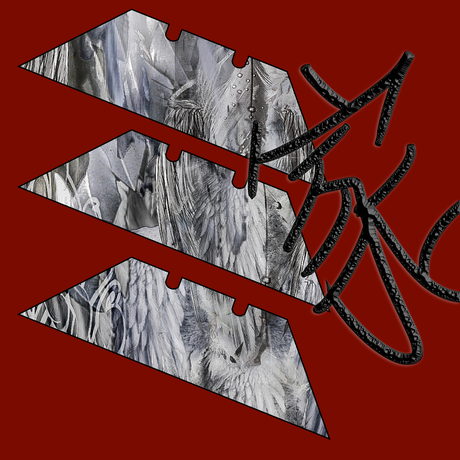
Cover for Soliloquy of the Distant Home [远家独白], released December 2017
LS: I was first introduced to your work via the early 2010s “weird Facebook” groups we were a part of—how do you feel like the online social element of digitally-produced artwork has informed your work over time? Do you feel like these sorts of online communities are helpful or harmful in the dissemination and historicization of your work?
NZ: Omg so much time we’ve “known” each other, hahahahahahaha. Facebook was where I really felt safe and able to actually talk to people. I felt like I could say exactly what I was feeling at that moment, and not be afraid of whether or not it was contextualized by the prison of my body. I fell in love over Facebook. I fell into vile, dark pits on Facebook. I lose and make new friends regularly.
This is where I wanna state that this shit is the reason I believe the idea of medium to be outdated, as well as the ideas of space, sociality, and performance.
These communities taught me how to see the world, and changed who I was, in a way that isn’t archived institutionally, and isn’t really thought of personally. Some artists treat the internet as a little shop of horrors in which they can find intriguing things. I try to have respect for what saved my life.
The way I see it, every single mishap or failure that I’ve encountered in this augmented world is a direct reflection of how overconfident previous generations of human beings were to create histories, produce movements, construct realities really. Nothing is accurate. Everything has more backstories than anyone else can comprehend. All ideas have already been had, been done, but some people got lucky and got to take credit at the right time and place.
Talent, beauty, innovation, these are just social interpretations of labor, and what’s shitty to me is that this kind of labor isn’t deemed necessary or important enough to pay everyone who does it.
I made some really nice friends though, and they paid for all my shit and taught me how to feel like I was loved. I learned a lot about myself and others.
Actually yeah, shoutout to the “weird Facebook” community for literally crowdfunding my artistic career and introducing me to Tea Strazicic (flufflord), who is amazing.
Shoutout to the “experimental” Soundcloud community for showing me that there was more to music than what I learned from western music theory.
And—duh, for real—shoutout to the whole slew of people who have helped me to even exist.
I owe everything to them, and nothing to institutions of art and learning. Except like $26,000 of debt. By the way, shoutout to Reed College for giving me a “full ride” that contained a lend portion, which doubled in proportion every year. Nice move.
N. Zhu: Press Intent, Released August 2017
LS: You mention here—and I’ve seen you mention before—these investigations and critiques of urban-creative labor and precarity, as well as the influence of Orientalism on the reception of these efforts. Could you expand on these topics and explain how they inform your working process, or your understanding of the current landscape of contemporary digital art?
NZ: I can talk about this all day because I have this narrative of struggle and it’s somehow even more self-centered than my current method of answering your questions, hahahahahahaha, ugh.
Instead, I’ll do the first two like this:
- Socioeconomic precarity is foundational to my existence
- Urban-creative labor thrives on the socioeconomic precarity of myself and those like me
And then the fun one:
The persistent existence of Orientalism has made it impossible for me look at a lot of this labor with a friendly face. It is predicated on an invisibility of the ignorance that it creates in its subjects, clouding the eyes of each artist, curator, creative director, musician, forcing them to only see criticism of Orientalism as an isolated population of semantic hairsplitting. Orientalism has no bearing on the hearts of its givers.
Orientalism offers a vision of how different I am, will always be. It has no respite in the loving arms of a family that I rarely talk to or a historical home that I am completely unfamiliar with. I don’t know about anyone else but I don’t get to lay into a nest of authenticity with a strong sense of family or home and it starts to feel like the Orientalist view is all I have, to feel and to offer.
I used to be (still am) bitter about seeing the triggering artifacts around, the decontextualized usage of prayer candles in a music video released on a respected experimental music label, the constant depiction of Asian urban environments as technological utopia/dystopia in digital/post-internet art, etc. Now I realize it’s equally stupid to ask a child not to be selfish, or a grown child to be considerate. I don’t call out artists anymore. I just talk a lot of shit to my friends, hahaha
On the other hand, shoutout to all the Asians who are using socially conscious political rhetoric to justify their continued appropriation of other cultures in order to give themselves substance. Seeing rich first-gen Asians performing what is essentially a costume of an underground club DJ or a rapper makes me feel a little cringey. Watching rhetoric evolve around them on topics of racial representation for doing such things is nauseating. Why would Asian representation in practices and communities formed under the glorification of our identity in order to subjugate other minorities be necessary? I know there’s always room for good intent, but I also know that politics is an effective branding tool.
Also, my criticism is a very American, consumer-perspective one. I don’t know what else exists but maybe I’ll have a more nuanced understanding later in my life.
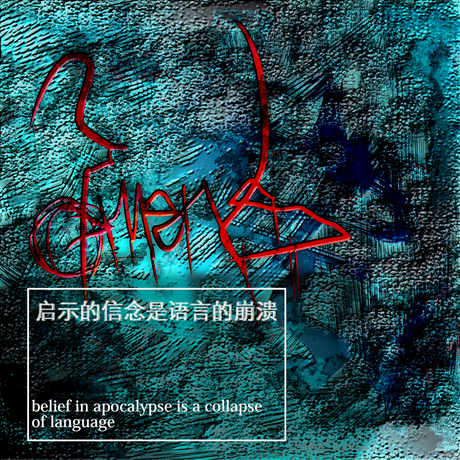
Image #3 from N. Zhu for FELT ZINE, released March 2017
LS: Have you found that working outside of a traditional gallery model of reception, financing, and community provides more freedom for artists working with mostly digital means, or do you think it’s inhibitory to your practice?
NZ: If I work within the model, then I have to stand around people who think they’re doing something good for society in a corrupt and abusive system.
If I really cared about being around art and supporting art, then I’ll help my friends. I’ll help my friends help their friends. I’ll help my friends throw shows to donate money to whatever it is that will help other people I think would be good friends. I can already satisfy my development of a better life and practice by not being in the model. Also, I don’t feel like it’s necessary have to market this aspect of my life to others in order to attain social capital out of my own political positions. I try to have all of my “good ethics/morals” ideals maintain themselves at the level of friendship, not large abstract models like “identity” or intricate, delicate systems like “community.” Also, fuck everyone who thinks that they’re a good person. Sorry.
I’m not going to go into any art situation that is about making someone else money, unless that person
1. Actually needs this money
2. Is someone I know and like, or,
3. Will give me a fat cut
My therapist’s position is that everyone has to work in one way or another, to be more empathetic towards people in general. Mine would be “Yeah, but working continuously without support is also continuously harmful to the body and mind, and people really don’t respect the resulting accumulation of trauma. They won’t understand that I was willing to be a bad person in order to survive. They don’t care that I am working to change that now.”
So I’m really thankful to have so many friends in my life. I’m really thankful for the ones that stay with me, believe in me, and smile as they watch me heal. Everyone I hurt, I’m sorry. Everyone who left, I’m not mad; I’m just sorry I couldn’t do it for you.
LS: In your text written for FELT zine, you describe Lawrence Lek’s Sinofuturism as “an incomplete project that doesn’t have a practical application,” and then go on to use the term, Sinofuturism, to describe your own work. Could you explain your conception of the term and how it applies to your practice?
NZ: Just so everyone knows, I’m not as shady as I used to be! Especially now that I realize how much it can hurt people. Like, there’s artists I want to fight, but I’m not going to talk about that online anymore.
I can criticize someone’s work and still want to be their friend, but for the most part, I’m trying to lay off of talking shit before I actually really know someone. It’s really hard though. I love talking shit.
Even if that video has a number of insightful perspectives, it’s actually a prescriptive breach into old ideas, presented as unexplored ideas, which is like, just another blip in the entirety of the history of innovation: speculation and confirmation bias-based justification.
I know it’s like, *really postmodern* of me to say nothing can begin or end, that all things create relative positions, that there is no absolute truth, that knowledge is isolated from everything but social construction, blah blah blah. But there isn’t an elimination of Orientalism, just a dilution of it into something more intellectually and politically palpable. This isn’t Lawrence Lek’s fault. The symbiotic gap between comprehensive effectiveness and dilution of discourse is an eternal problem in political, social, and technological criticism.
Also, why does every single technological work end up feeling fascist? Why is it that if you spend enough time giving technology the respect of medium-specific forms, it starts to act like a shitty dictator of ideas instead of people? We can do better than cold, heartless words on the topic at hand. We can do better than simply depicting the dystopic.
I’m over theory, and I’m over art that does not acknowledge its own hypocrisy. Actually, yeah, I want to say it: I’m a hypocrite, ask me anything.
The most useful thing I’ve ever had in my life is emotional intelligence and only recently have I learned how to use that in a way that doesn’t harm other people. Why should my art be held to any other standard? Why should anyone’s?
There is no physical manifestation of “accepting responsibility,” which makes things like social practice seem really stupid and bleak. There are only perceived theoretical entities that serve solely to furnish the phenomena of the world and its inhabitants. There is no defined line between “work” and “play,” “guilt” and “innocence,” “Orientalism” and “Objectivity.” Semantic ambiguities crush people in the forever present, the ineffable gap between all human beings, whose only window to each other is a complexifying system of tools that we are intent on giving more power. I’ve failed, and everyone has failed me.
That being said, any uncertainty used as a theoretical concept is the post-structural regurgitation of the inherent inability of Western philosophy and logic to confront and resolve the possibility of a universal solipsism….so maybe I should get my marbles straight, and commit to one of the many sides that exist in a world under its own siege.
Questionnaire
Age:
Just turned 24
Location:
Los Angeles but not for long ;) Berlin ppl hmu
How/when did you begin working creatively with technology?
I started making digital photographs to document a graffiti practice and take pictures of my friends because I wanted to be Nan Goldin as a teenager, and then moved to video shortly thereafter. Other digital mediums came into my life via Akihiko Miyoshi in college, but I learned 3D modeling and sound design on my own.
Where did you go to school? What did you study?
I went to Reed (don’t judge me pls). I wanted to fulfill my destiny and be a doctor so I went in for biology, but then I spent two weeks on 2C-I and realized that I wanted to study art instead.
What do you do for a living or what occupations have you held previously?
I worked at a salad bar when I first moved here. I was at MOCA for the last year (which was simultaneously a joke and torturous) while freelancing for anything I can do, which is really anything. I worked AV at the Hammer. I made album art. I begged for money from my rich friends. I still freelance so, help me.
Right now, I’m trying to keep my job as a graphic designer and sound designer at Headspace, which is great, because I love startup culture and all the free food and stuff, but as I have been trying to say, everything is at least a little fucked up.
What does your desktop or workspace look like? (Pics or screenshots, please!)
That’s flufflord’s Gosha scarf, not mine.
